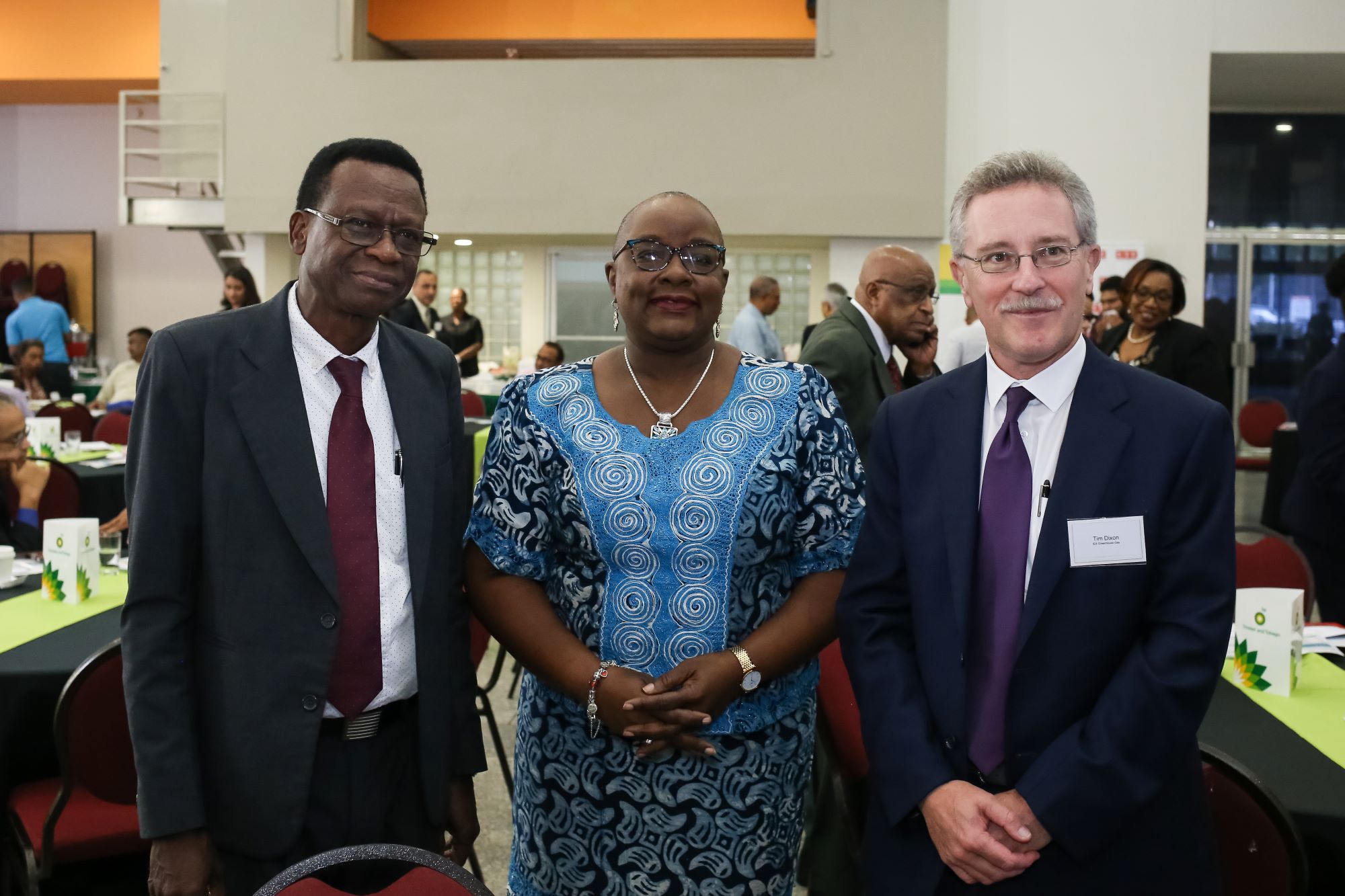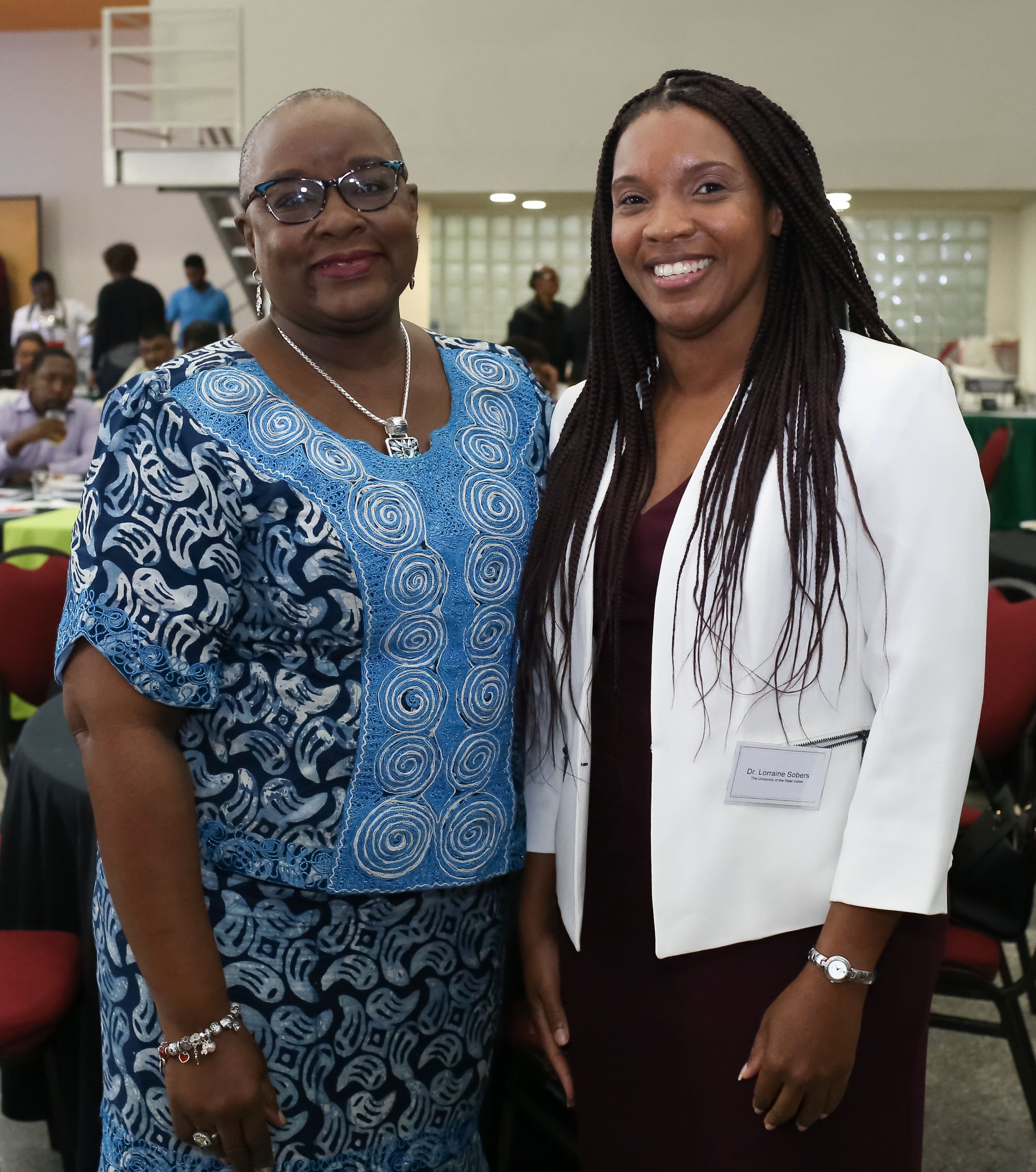News Releases
UWI, University Partners and Energy Stakeholders Mobilise for Carbon Dioxide Emission Reduction
For Release Upon Receipt - November 11, 2019
St. Augustine

(L-R) Professor of Practice at The UWI St. Augustine Campus Andrew Jupiter, Minister of Planning and Development the Hon. Camille Robinson-Regis, and Mr. Tim Dixon, General Manager of the IEA Greenhouse Gas R&D Programme at the International Knowledge-Sharing Symposium to further the development of a Carbon Capture and Storage (CCS) Programme in Trinidad and Tobago
ST. AUGUSTINE, Trinidad and Tobago. November 8, 2019 – “The more we disrupt our climate, the more we risk severe, pervasive and irreversible impacts, we have the means to limit climate change and build a more prosperous, sustainable future” said Mr. Tim Dixon, General Manager of the IEA Greenhouse Gas R&D Programme (IEAGHG), at the recent International Knowledge-Sharing Symposium aimed at reducing carbon dioxide emissions in the energy sector.
This symposium titled “Developing of a Carbon Capture and Storage (CCS) Programme in Trinidad and Tobago” was organised by the CO2 Emission Reduction Mobilisation (CERM) Project partners; The UWI St. Augustine Campus and The University of Trinidad and Tobago (UTT) in collaboration with IEAGHG and the University of Texas, Austin. The symposium, which took place on October 29 -30 at the UTT Energy Campus, Pt. Lisas, included participants from several government institutions, the local energy sector, the World Bank and the International CCS Knowledge Centre and was sponsored by BHP and BPTT.
The UWI St. Augustine is partnering with the University of Texas, Austin and UTT to create a new clean industry that will store greenhouse gases underground and mitigate Trinidad and Tobago’s contribution to human-induced climate change. Notably, Carbon Dioxide Enhanced Oil Recovery (CO2EOR) and CCS have been positioned as two key technologies in carbon dioxide emission reduction. CCS has significant potential to mitigate climate change, particularly in countries with large reserves of fossil fuels and a fast-increasing energy demand. CO2EOR, on the other hand, has been identified by industry experts, researchers and local oil producers as a viable option for increasing Trinidad and Tobago’s heavy oil production.
Minister of Planning and Development, the Honourable Camille Robinson-Regis delivered the symposium’s feature address noting that Trinidad and Tobago was the first Caribbean country and second Small Island Developing State (SIDS) to submit its international commitment to climate change, back in August 2015. “This commitment formally became the Nationally Determined Contributions (NDCs) of Trinidad and Tobago upon ratification of the Paris Agreement in February 2018. It is arguably, the most ambitious national target in the region. Trinidad and Tobago declared the NDC to reduce overall emissions in the power generation, transportation and industrial sectors by 103 million tonnes of equivalent carbon dioxide emissions.”
Dr. Lorraine Sobers, CERM Project Coordinator and Lecturer in Petroleum Engineering at The UWI St. Augustine Campus shared public perspectives on greenhouse gas emission reduction in Trinidad and Tobago; highlighted opportunities for carbon dioxide emission reduction through CCS and CO2EOR and, the need for methane emission reduction.
Following the symposium, The UWI and its partners under the CERM project intend to build public awareness of the initiative in Trinidad and Tobago. Dr Sobers also noted that CERM will focus on capacity building at educational institutions, international partnerships and local research and development of CCS and CO2EOR.
Learn more about the CERM project at http://www.thecermproject.com/.

(L-R) Minister of Planning and Development, the Hon. Camille Robinson-Regis and Dr. Lorraine Sobers, Lecturer in The UWI St. Augustine Campus Department of Chemical Engineering and Coordinator of the Carbon Dioxide Emission Reduction Mobilisation (CERM) project at the International Knowledge-Sharing Symposium
Contact
Marketing and Communications Department
- Tel.: (868)-662-2002 ext.2013/2014
- Email: marketing.communications@sta.uwi.edu

